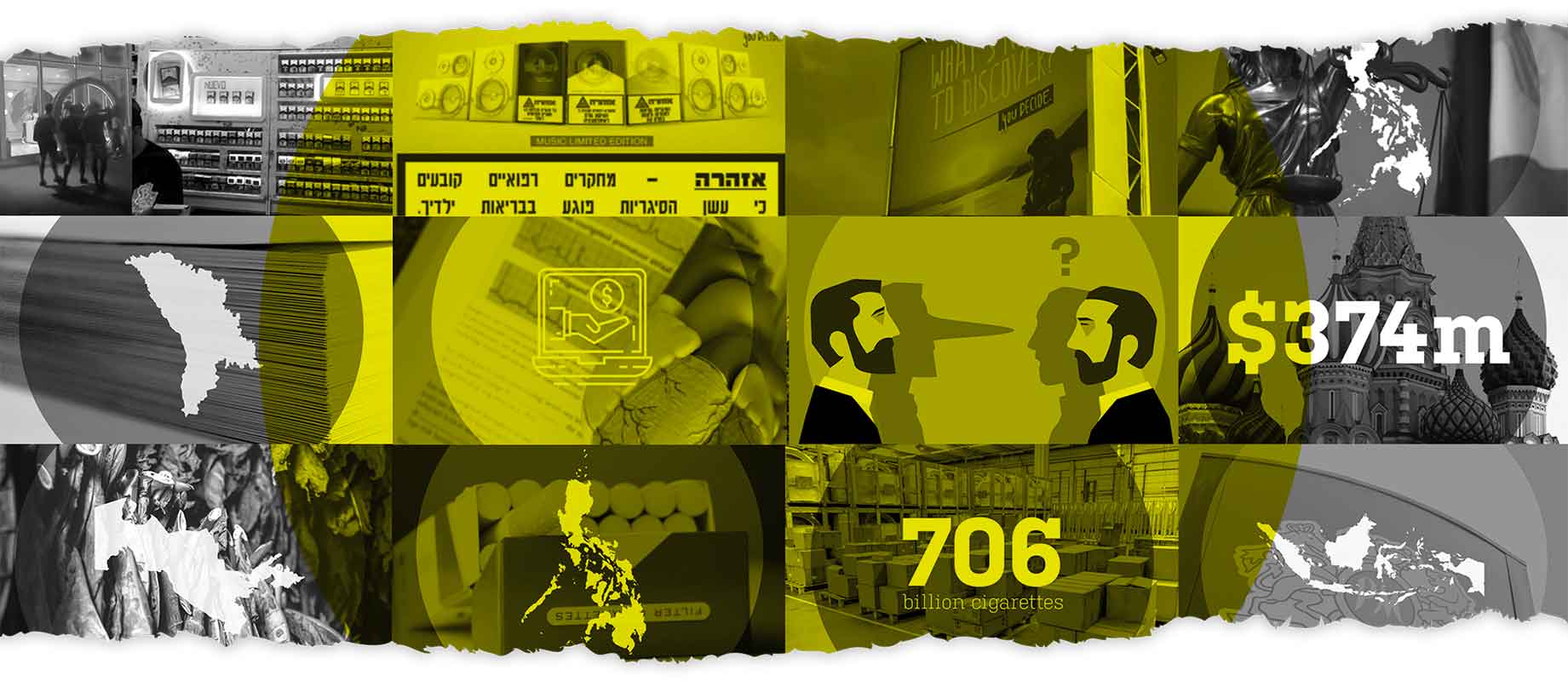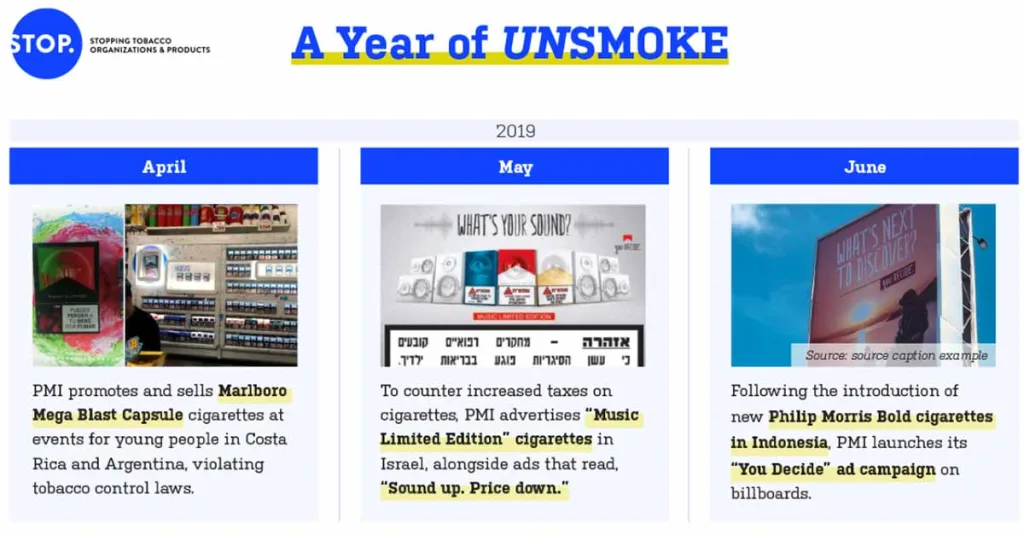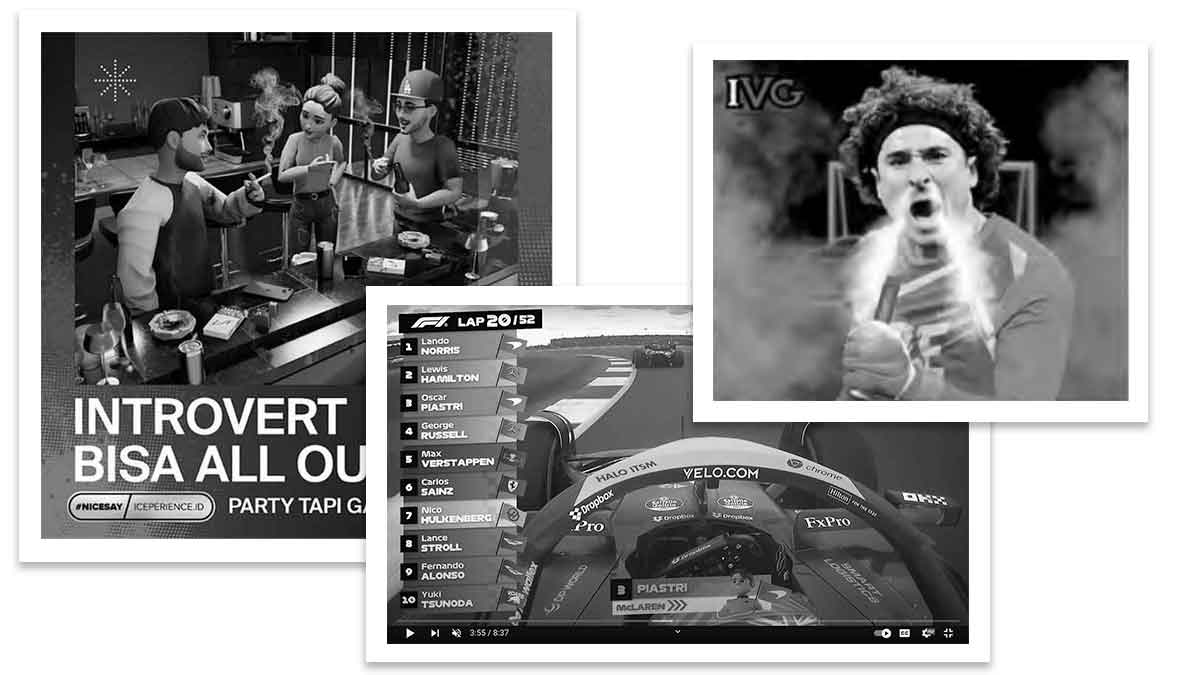- Resources
- News
-
-
Get Email Updates
Sign up for STOP's emails and never miss an update on our latest work and the tobacco industry's activity.
-
Get Funding
Ready to tackle industry interference? You could be eligible for a grant.
-
Share a Tip
Do you have information on tobacco industry misconduct in your country? Let us know.
-
Get Email Updates
Next Generation Addiction
April 02, 2020

On April 8, 2019, Philip Morris International (PMI) made a claim meant to shock the world: PMI was going smoke-free. To kick off its “Year of Unsmoke,” Philip Morris International made a public plea to “smokers, nonsmokers, regulators and agents of change” to help “remove smoke from our world.”
It sounds nice. And it aligns well with PMI’s extensive on-going attempts to revamp its public image. But it doesn’t add up: Getting smokers to quit altogether and preventing a new generation from starting would mean creating a large dent in PMI’s highly profitable cigarette business—something that would concern any shareholder.
That’s why it came as no surprise that just one month later, in May 2019, PMI CEO André Calantzopoulos reassured shareholders, “Our combustible tobacco portfolio remains the foundation of our business.”
A close look at PMI’s actions over the past year revealed that, far from “unsmoking” the world, it continues to make as much money from the tobacco epidemic as it can. It has made hundreds of billions of cigarettes, marketed to young people and fought policies that would actually reduce smoking.
The actions taken over the past 12 months clearly show how PMI’s #UnsmokeIsAJoke.
April 2019
PMI promotes and sells flavored cigarettes at events for young people in Costa Rica and Argentina, violating tobacco laws in both countries.
In direct contradiction to one of the campaign’s core messages (“If you don’t smoke, don’t start”), PMI advertised and sold Marlboro Mega Blast Capsule cigarettes at the point of sale at events such as Lollapalooza (March 2019) and Rock at Baradero in Buenos Aires. Although governments have attempted to ban flavors in Latin America, the tobacco industry has strongly opposed this policy, which is meant to prevent youth smoking.
May 2019
PMI advertises “Music Limited Edition” cigarettes in Israel.
To counter increased taxes on cigarettes and ensure their products were easily accessible, PMI lowered Marlboro prices and ran ads for limited-edition music-themed packs using the slogans, “Sound up. Price down,” and “What’s Your Sound?” The ads were part of PMI’s new “You Decide” campaign and appeared in print publications.
June 2019
PMI introduces a new brand of cigarettes and launches its “You Decide” ad campaign in Indonesia.
Despite a public commitment to “unsmoke” the world, Philip Morris International introduced a new high-tar, high nicotine cigarette brand, Philip Morris Bold, in Indonesia. To promote the new cigarette, PMI ran television and billboard ads throughout the country and to the large tourist population in Bali.
July 2019
A long-running case involving Philip Morris Fortune Tobacco Corporation (PMFTC) takes another step as a Philippine city fights industry legal action.
When the city of Balanga attempted to institute a smoke-free ordinance for its University Town, it was met with legal challenges in 2017 from the Philippine Tobacco Institute, representing Philip Morris and other tobacco companies. In 2018, the Regional Trial Court ruled in favor of the tobacco industry. The legal battle against PMFTC continued when the city issued an appeal in July 2019 to fight for the smoke-free ordinances its residents supported. Dr. Ulysses Dorotheo of the Southeast Asia Tobacco Control Alliance said of the legal challenge, “If Philip Morris is genuinely supportive of a smoke-free world, it should be supporting and not opposing Balanga’s efforts to protect present and future generations from the harms of tobacco and nicotine addiction, in line with the global health treaty, the WHO Framework Convention on Tobacco Control (FCTC).”
August 2019
Efforts by PMI to interfere with tobacco control policy in Moldova are exposed.
Swiss officials lobbied on behalf of PMI to persuade Moldovan officials that PMI deserved to be part of the conversation around newly proposed, strict tobacco laws. PMI won a seat at the table, but Moldovan lawmakers passed the legislation, nonetheless. This advance was made with blatant disregard for the WHO Framework Convention on Tobacco Control, to which Moldova is a party, and which states that tobacco industry interference in policymaking should not be tolerated.
September 2019
Philip Morris Limited makes multiple attempts to partially fund Israeli medical students’ education in exchange for participation in PMI “health” programs.
When Philip Morris Limited (the Israeli affiliate of PMI) reached out to the Bar-Ilan University Azrieli Faculty of Medicine to offer students grants in exchange for participating in 120 to 130 hours per year of PMI programs about smoking, the university rejected the offer. Philip Morris Limited then approached the school’s Medical Students Union with the same offer, and the Union also rejected it due to “moral flaw.” A third attempt with the National Medical Students Association was also rejected. Chairman of the Israel Association of Public Health Physicians, Professor Hagai Levine, told Haaretz.com, “Under the Convention on Tobacco Control and according to health authorities world over, no one should be taking a scholarship from a tobacco company, certainly not medical students. In Israel alone, 8,000 people die every year [from smoking], many of them from Philip Morris products.”

Our combustible tobacco portfolio remains the foundation of our business.
PMI CEO André Calantzopoulo 3
October 2019
PMI is forced to settle millions in unpaid taxes in Russia.
Upon discovering that PMI had underpaid excise taxes and VAT (value-added tax) by USD $374 million, Russian authorities required the company to pay the balance. Underpaying—or not paying—taxes is a common tactic tobacco companies use to keep cigarette prices low and undermine tobacco control.
November 2019
PMI uses a third-party consulting firm to reach out to academic institutions.
Researchers and academic institutions reported attempts made by Handshake—a consulting firm hired by PMI—to commission research around corporate transformation. It’s an ironic topic, considering PMI continues to manufacture and market cigarettes and has made—and continues to make—the majority of its profit from combustible products. Historically, research commissioned by the tobacco industry has conveniently supported whatever narrative the industry was trying to push at the time; this latest attempt would likely have been used to support its self-positioning as a solution to the tobacco epidemic.
December 2019
PMI expands cigarette production capabilities in Uzbekistan.
As part of a partnership with local tobacco company Tashkent Tobacco, PMI expanded its cigarette production by licensing the company to manufacture Marlboro, Parliament and L&M cigarettes. The expansion, which extended PMI’s cigarette market in the country, was celebrated with an official launch ceremony, attended by senior PMI executives.
January 2020
Philip Morris Brands files 14 trademarks in one day for use in the Philippines.
A search of trademark applications showed that on January 27 alone, Philip Morris Brands (a subsidiary of PMI) submitted 14 trademark applications for tobacco products—eight related to Marlboro directly. The proposed trademarks were all indicated for use in the Philippines. They included language that harkens back to cigarette marketing of the past, such as, “Experience a world of fresh taste,” and “Where smooth taste begins.” Other proposed trademarks promote flavored and even menthol cigarettes, which evidence shows appeal to young people and new smokers and which are being banned by some jurisdictions. These new trademark applications show that Philip Morris Brands is actively pursuing ways to market cigarettes in low- and middle-income countries like the Philippines.
February 2020
PMI boasts about the production of billions of cigarettes and the success of Marlboro.
In a PMI report featuring the slogan, “Delivering a Smoke-Free Future” under its logo, the company boasted that Marlboro cigarette shares are currently at an “all-time high.” PMI went on to highlight in a presentation of the company’s 2019 fourth-quarter and final-year results that the company shipped 706 billion cigarettes globally in 2019.
March 2020
PMI is caught advertising cigarettes near schools in Indonesia.
In an exposé featured on the UK’s Channel 4 Dispatches, video footage showed cigarette advertisement banners hung outside a local shop, viewable by students at multiple nearby schools. Upon release of the footage, PMI removed the banner. This blatant advertising to youths is especially egregious given that around 20% of 13-15-year-olds in Indonesia smoke.
Philip Morris International’s Year of Unsmoke has proven to be yet another public relations attempt by the tobacco industry to makeover its image in order to garner public support and—it hopes—a seat back at the policy-making table.



